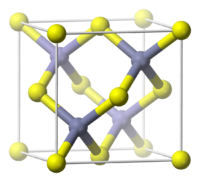CdTe
 |
|
 |
|
| Names | |
|---|---|
| Other names
Irtran-6
|
|
| Identifiers | |
|
3D model (JSmol)
|
|
| ChemSpider | |
| ECHA InfoCard | 100.013.773 |
|
PubChem CID
|
|
| RTECS number | EV3330000 |
|
|
|
|
| Properties | |
| CdTe | |
| Molar mass | 240.01 g/mol |
| Density | 5.85 g·cm−3 |
| Melting point | 1,041 °C (1,906 °F; 1,314 K) |
| Boiling point | 1,050 °C (1,920 °F; 1,320 K) |
| insoluble | |
| Solubility in other solvents | insoluble |
| Band gap | 1.5 eV (@300 K, direct) |
|
Refractive index (nD)
|
2.67 (@10 µm) |
| Structure | |
| Zinc blende | |
| F43m | |
|
a = 648 pm
|
|
| Hazards | |
|
EU classification (DSD) (outdated)
|
Harmful (Xn) Dangerous for the environment (N) |
| R-phrases (outdated) | R20/21/22, R50/53 |
| S-phrases (outdated) | (S2), S60, S61 |
| US health exposure limits (NIOSH): | |
|
PEL (Permissible)
|
[1910.1027] TWA 0.005 mg/m3 (as Cd) |
|
REL (Recommended)
|
Ca |
|
IDLH (Immediate danger)
|
Ca [9 mg/m3 (as Cd)] |
| Related compounds | |
|
Other anions
|
Cadmium oxide Cadmium sulfide Cadmium selenide |
|
Other cations
|
Zinc telluride Mercury telluride |
|
Except where otherwise noted, data are given for materials in their standard state (at 25 °C [77 °F], 100 kPa).
|
|
|
|
|
| Infobox references | |
Cadmium telluride (CdTe) is a stable crystalline compound formed from cadmium and tellurium. It is mainly used as the semiconducting material in cadmium telluride photovoltaics and an infrared optical window. It is usually sandwiched with cadmium sulfide to form a p-n junction solar PV cell. Typically, CdTe PV cells use a n-i-p structure.
CdTe is used to make thin film solar cells, accounting for about 8% of all solar cells installed in 2011. They are among the lowest-cost types of solar cell, although a comparison of total installed cost depends on installation size and many other factors, and has changed rapidly from year to year. The CdTe solar cell market is dominated by First Solar. In 2011, around 2 GWp of CdTe solar cells were produced; For more details and discussion see cadmium telluride photovoltaics.
CdTe can be alloyed with mercury to make a versatile infrared detector material (HgCdTe). CdTe alloyed with a small amount of zinc makes an excellent solid-state X-ray and gamma ray detector (CdZnTe).
CdTe is used as an infrared optical material for optical windows and lenses and is proven to provide a good performance across a wide range of temperatures. An early form of CdTe for IR use was marketed under the trademarked name of Irtran-6 but this is obsolete.
...
Wikipedia
